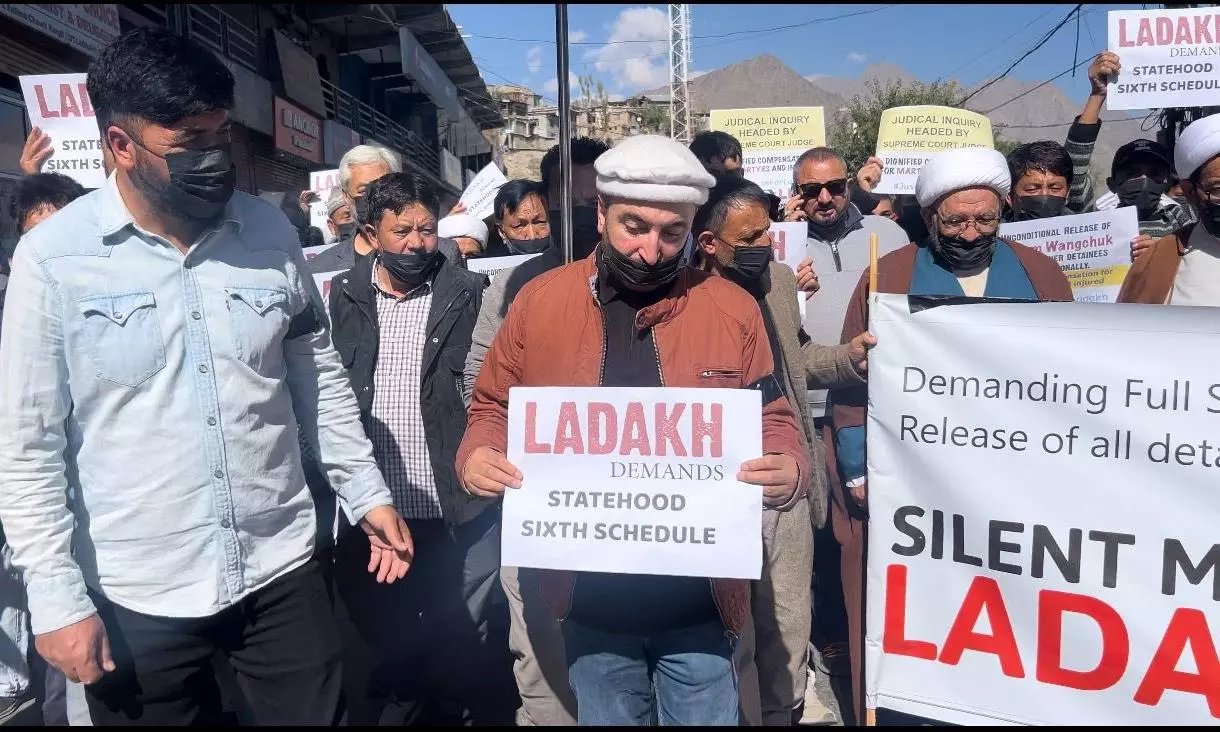
Ladakh statehood: Leh faces curbs, internet ban; Kargil holds silent march
Ladakh’s Leh saw tight curbs and internet ban, but Kargil marched peacefully demanding statehood, Sixth Schedule status, and justice for firing victims

A planned silent march, jointly called by Leh Apex Body (LAB) and Kargil Democratic Alliance (KDA) as part of their agitation for statehood and safeguards under the Sixth Schedule of the constitution, was thwarted on Saturday (October 18) as authorities imposed strict security measures and suspended mobile internet.
However, Kargil witnessed a peaceful silent march with KDA leaders condemning the restrictions in Leh. They also welcomed the announcement of a judicial probe into the September 24 firing incident that left several people dead. They also urged the government to release all detained persons including climate activist Sonam Wangchuk.
The two agitating groups had called for a two-hour silent march from 10 am and three-hour blackout from 6 pm across Ladakh to express solidarity with those who lost their lives and were affected in widespread violence on September 24. However, the region witnessed heavy deployment of police and paramilitary forces.
Also Read: Judicial inquiry ordered into Leh violence fulfils Ladakh's demand: Chief secretary
Suspension of mobile internet
The authorities imposed prohibitory orders under Section 163 of BNSS in Leh and suspended mobile internet services in view of law-and-order concerns. In addition to that, they also ordered the closure of educational institutions.
"We have called for a silent march to peacefully highlight our demands. However, the administration demonstrated its failure by using its might. They heightened security and did not allow the people to assemble for the march,” Anjuman Imamia and Ashraf Ali Barcha told reporters. Imamia is the president of Leh Apex Body, and Barcha is a member of the body.
They said the government should hold talks with the people rather than implementing such curbs to browbeat them.
Abdul Qayoom, the leader of Anjuman Moin-ul-Islam, said that the co-chairman of the LAB, Chering Dorjay, was also put under house arrest. Qayoom appealed to people not to make any attempt to reach the venue of the march in view of the stringent security measures.
“We do not want any confrontation and will not allow anyone to fail the talks (with the Union government). We will meet again and decide the future course of action,” he added.
Also Read: Ladakh violence: SC defers hearing as Wangchuk’s wife seeks to amend plea
Kargil witnessed peaceful march
In Kargil, hundreds of people led by KDA leaders, including co-chairman Asgar Ali Karbalai and Sajjad Kargili, held a peaceful march from Hussaini Park to the main bus stand. The participants wore black bands and carried placards reiterating their demands.
“We welcome the centre’s decision to order a judicial inquiry into the September 24 violence in Leh and want the government to announce unconditional release of all detained persons including climate activist Sonam Wangchuk and adequate compensation for the families of four slain persons and those injured,” Sajjad Kargali said while addressing the gathering.
Later talking to reporters, Karbalai condemned the curbs placed on the LAB leadership and the people in Leh and said “such oppressive steps are not acceptable to the peace loving people of Ladakh”.
“We welcome the judicial inquiry and want the government to take two more steps before resuming dialogue. We are always in favour of talks — in the past, today and tomorrow. Let the government announce compensation for the victims and order release of detained persons,” he said, adding that the talks should be specifically held on statehood and extension of sixth schedule to Ladakh.
He said the people of Ladakh neither tired nor willing to bow down and they cannot be intimidated. “We are ready for any type of sacrifice for our legitimate demands,” he said.
Karbalai thanked civil society across country who supported them in the aftermath of the Leh violence and demanded action against those who tried to tarnish the image of the people of Ladakh by dubbing them as anti-national.

